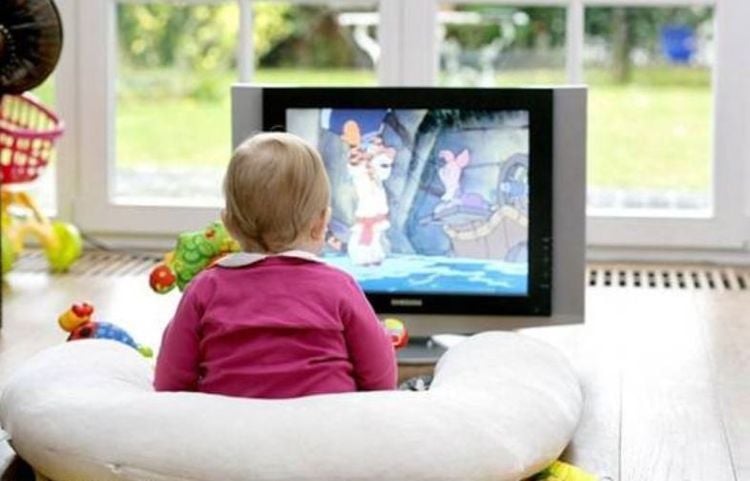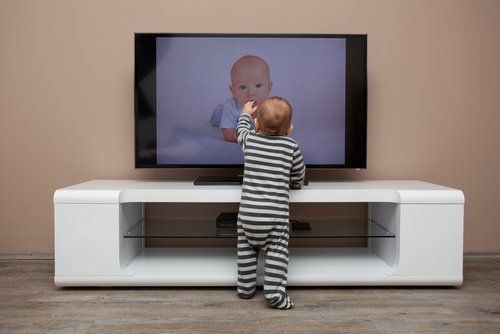This is an automatically translated article.
Today, there are many programs on television for children, so it is not difficult to choose a program, a cartoon for children. However, reality shows, children are growing up in a world saturated with media from televisions, phones, tablets,...
It's time for you to teach children the habit of teaching children healthy habits, so that children know how to manage time watching TV as well as using other technology devices.
1. Is it harmful for children to watch TV?
There are many parents who say “My kids love watching TV!”. Babies to toddlers can stare at bright colors and movements on the screen, but their brains are not yet capable of recognizing or making sense of all the images. that's strange.
Normally, the brains of children 18 months and older are not developed enough to understand the symbols on the screen and to be able to visualize their equivalents in the real world.
What babies and toddlers need to learn most is interaction with those around them. That's not to say kids shouldn't video chat with grandparents or parents far away. But when it comes to everyday learning, children need to touch things, hold them and most of all to see the faces and hear the voices of the people they love most.
Apps on phones and computers can teach toddlers to tap and swipe on screens, but studies tell us that these skills don't help children's learning in the real world.

Cha mẹ nên hạn chế cho trẻ xem tivi quá sớm
Overuse of digital media can put children at risk for the following problems:
Not getting enough sleep: Young children are exposed to more media or have TVs, computers or mobile devices Active in the bedroom will sleep less and sleep later at night. Even babies can be overstimulated by TV screens and miss out on the sleep they need for their growth. Delays in learning and social skills: Children who watch too much TV between birth and kindergarten may have developmental delays in attention, thinking, and language. language and social skills. One of the reasons for the delay can be because the child has less interaction with parents and family. Parents who always turn on the TV or focus on their own digital media miss valuable opportunities to interact with their children and help them learn. Obesity: Children's heavy media use during the preschool years is associated with weight gain and childhood obesity risk. Food and junk food ads while watching TV can motivate children to eat more leading to obesity. In addition, children who abuse media are less likely to be active with physically healthy games, thus storing more excess body fat. Behavior problems: Violent content on TV and screens can contribute to behavioral problems in children. Because they are scared and confused by what they see or they will try to imitate the actions of the characters on the screen.
2. How to let children watch TV for good?
Children can also spend some time during the day watching TV or using other electronic devices as long as they watch the programs that are age appropriate, of high quality and must be watched with an adult.
But there are too many programs on TV that are not suitable for children, which can hinder a child's healthy mental and physical development, and can even lead to long-term problems for children. Here are tips for managing your toddler's TV time.
2.1. Set limits on TV viewing Limit TV time: Most parents say their children watch two or more hours of TV a day. While the American Academy of Pediatrics (AAP) recommends that children 2 to 5 years old spend no more than an hour a day using any one technology including TVs, tablets, and phones. or computer. In particular, children under 18 months of age should not use digital media. Keep your child's brain inactive while he watches TV. Break the time your child watches TV into small intervals, increasing from 10 to 15 minutes. Also need to leave the TV outside the bedroom and turn off the TV during meals.

Cha mẹ nên đặt ra giới hạn khi cho trẻ xem TV
Set rules from the beginning: You need to establish rules for watching TV for your child from day one. This makes it easier for you to control how long your child watches TV as they get older. It will be a lot easier to relax your standards later on than it is to let your child watch TV whenever he feels like it. Make TV viewing a privilege: You shouldn't let TV time become an expectation of your child. However, you can make requests for children to follow in order to watch TV for a period of time, which can be surprisingly effective. Make TV screens inconvenient: Consider leaving your TV and other electronic devices in a small, hidden room in your house or in a closet that stays closed when turned off. Turn off the TV when no one is watching. Because turning on the TV screen in the background still distracts and reduces the interaction between parents and children. 2.2. Choose high-quality children's programs Choose simple programs: Slow-paced programs give young children time to think and absorb. Choose simple, age-appropriate programs that emphasize interactivity. Programs that inspire children to make sounds, talk, sing and dance. A lot of random activities in action/adventure cartoons can confuse children and creepy shows will cause stress and fear for children. Some studies show that children who watch violent programs on TV are more likely to exhibit aggressive behavior.
Watch specific programs: Instead of allowing your child to watch anything on TV, select programs carefully. Check for reviews from trusted sources like family and friends and preview shows before showing them to your kids. When the program ends, turn off the screen. Notifying two minutes in advance, followed by a 10-second countdown that screen time is coming to an end makes it easier for kids to move on to the next activity.
2.3. Be a guide and model for your child to watch TV Watch TV with your child: You need to watch TV with your child. The TV, phone, or tablet should not be used as a babysitter. Research shows that children learn better when adults are around to reinforce learning while watching TV as well as when using other electronic devices. Take TV seriously: Even young children can learn to watch TV without you needing to "adjust" later. If you're watching TV with commercials, talk about what's going on in the show and in the commercial, and explain the difference between the two. Encourage children to ask questions and relate what is happening in the program to their daily lives. If you are watching a recorded video or program, pause the program to discuss with your child what is going on in the program.
Connecting TV shows to the real world: By engaging your child in TV time, you can help your child make a connection between what he has watched and the real world around him.

Cha mẹ có thể giúp trẻ xem TV một cách nghiêm túc
If you and your child have just finished watching a program in which a number is introduced, talk about the number and find an example of that number to show your child. For example, when you're setting the table, you might say, "Today's number mentioned in the program is three, and there are three seats!". Then, read and discuss a number exploration book with your child.
If your child likes a program about wildlife, you can go to the library together to choose books about animals. Or if the characters from a show love baking or doing an art project, you and your baby could try a similar activity.
Be a role model for children to learn: Children are most influenced by their parents, they will observe how you use TV and learn. Therefore, do not surf the channel or let the TV make noise to people around. If your child finds you frequently eager to sit down to watch a particular show and focus on what you're watching, he or she will realize the potential for enjoyment that other movies and shows promise. Plan TV viewing for the whole family: In addition to thinking about your child's TV time, consider when and how other people in your family use TV. Talk to family members about ground rules for using TVs and other electronic devices. At the same time, commit to follow the plan. In addition, in order to prevent diseases that babies often get, parents should pay attention to a diet to improve the child's resistance. At the same time, add supporting foods containing lysine, essential micro-minerals and vitamins such as zinc, chromium, selenium, B vitamins,... snacks and less digestive problems.
Parents can learn more:
Why do you need to supplement Lysine for your baby?
The role of zinc - Guidelines for reasonable zinc supplementation
Please visit the website Vinmec.com regularly and update useful information to take care of your baby and family.
Articles refer to sources: babycenter.com, healthychildren.org













